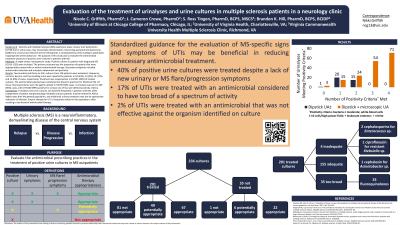Category: UTIs
Poster Session: UTIs
1679 - Evaluation of the Treatment of Urinalyses and Urine Cultures in Multiple Sclerosis Patients

- NG
Nikki C. Griffith
Infectious Diseases Pharmacy Fellow
University of Illinois at Chicago College of Pharmacy
Chicago, IllinoisDisclosure: I do not have any relevant financial / non-financial relationships with any proprietary interests.
- BH
Brandon Hill
Clinical Pharmacist, Infectious Diseases
UVA Health
Charlottesville, VirginiaDisclosure: I do not have any relevant financial / non-financial relationships with any proprietary interests.
- ST
S. Ross Tingen
Clinical Pharmacist
VCU Health System
Richmond, VirginiaDisclosure: I do not have any relevant financial / non-financial relationships with any proprietary interests.
- JC
J. Cameron Crowe
PGY-1 Pharmacy Resident
UVA Health
Charlottesville, VirginiaDisclosure: I do not have any relevant financial / non-financial relationships with any proprietary interests.
Presenting Author(s)
Co-Author(s)
Background: Patients with Multiple Sclerosis (MS) experience lower urinary tract dysfunction (LUTD) that in some cases, may necessitate catheterization. Discerning asymptomatic bacteriuria (ASB) from urinary tract infection (UTI) in MS patients is complicated by LUTD, leading to potentially inappropriate antimicrobial use. The purpose of this study was to evaluate the antimicrobial treatment practices of positive urine cultures in patients with MS.
Methods:
A single-center, retrospective study. Positive cultures in patients with diagnosed MS (ICD10: G35) were included. The primary outcome was the proportion of patients that were appropriately treated with or without antimicrobial therapy. Secondary endpoints included antimicrobial selection and urinalysis obtainment and positivity.
Results: 236 cultures from 139 patients were evaluated. Frequency, nocturia, dysuria, and foul-smelling urine were reported by patients in 54 (23%), 10 (4%), 25 (11%), and 14 (6%) of cases, respectively. Treatment was inappropriate in 81/201 (40%) of treated cultures. The agent selected was considered too broad in 35/201 (17%) instances. Of those, fluoroquinolones were the agents utilized in 33/35 (94%) cases. A urinalysis was sent in 200 (85%) cases, with 197/200 (99%) positive for at least one of four pre-defined positivity criteria.
Conclusion: Urinalyses and urine cultures are obtained frequently in patients with MS, often independent of patient symptomatology. Multiple sclerosis patients may be treated for ASB at higher rates than the general population, and traditional urinary symptoms may not be appropriate indicators of infection. Empiric therapy for UTI is frequently utilized in this population, often resulting in too broad of antimicrobial therapy.

